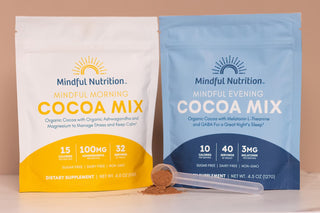Did you know that a tiny, barely noticeable amino acid could be the key to peace and relaxation?
You may have heard that L-theanine may help you get a better night’s sleep. You may even pair it with a magnesium-rich hot beverage for clarity and mindfulness. It seems that L-theanine wears many hats – so many that it almost seems too good to be true.
So, how is it that one compound may be responsible for so many things? What is L-theanine, exactly, and how has it taken this long for it to reach the spotlight?
Let’s unpack the answers to these questions and more as we explore how L-theanine affects relaxation, sleep, and wellness.
Key Takeaways:
- L-theanine is an amino acid that’s abundant in tea leaves, especially green tea. It’s known for its relaxing effects.
- Because it’s structurally comparable to neurotransmitters like GABA, L-theanine may interact with the brain in similar ways.
- L-theanine is commonly studied for potential roles in supporting relaxation, sleep quality, and attentiveness.
- L-theanine is generally safe and well-tolerated, but may cause mild side effects like headaches, nausea, and irritability. Consult with a healthcare provider before consuming L-theanine.
See Related: 5 Best Sugar Substitutes for Better Health
What Is L-Theanine?
There’s a good reason that warm, sweet cup of tea has a reputation for being oh-so comforting. Spoiler alert: it’s not the cream and sugar (or lack thereof), and it’s not the blend of tea you choose. It’s something that’s too small to be perceptible by the human eye: L-theanine.
L-theanine is a unique amino acid commonly found in tea leaves, particularly green and loose-leaf teas. Like other amino acids, L-theanine is used by the body to make proteins, the building blocks of life. What makes L-theanine unique, though, is its potential mood-relaxing and calming effects.
Researchers believe L-theanine may contribute to the calming experience many associate with tea. In fact, it’s so abundant that it may be responsible for up to 50% of the total amino acids in your cup!
It’s no wonder that L-theanine has gained popularity and public attention as a nootropic agent. In supplement form, L-theanine often comes in pill form or tablet form. But how does L-theanine actually perform outside of tea leaves?

How it Works
Before we can understand just what L-theanine does, we first have to take a brief neuroscience lesson.
Within the brain are compounds called neurotransmitters, which act as “chemical messengers.” They ensure that neurons may communicate with each other and other parts of the body, like nerve cells.
There are two specific neurotransmitters that are relevant when it comes to L-theanine:
- Glutamate. This is the most abundant “excitatory” neurotransmitter in your brain. When released, it stimulates or “excites” a nerve cell. It also ensures that chemical messages continue to move forward from one cell to the next, meaning it’s essential for proper brain function.
- Gamma-aminobutyric acid (GABA). This is a calming neurotransmitter that’s created from glutamate. GABA also plays a crucial role in sleep, anxiety regulation, and relaxation.
Both of these have structural similarities to L-theanine. That means that L-theanine may interact with the brain in ways that are comparable to glutamate and GABA. L-theanine has also been noted for its ability to enhance GABAergic activity, meaning it could lend a helping hand related to GABA.
So, what does this actually mean in terms of experience? L-theanine is thought to interact with neurotransmitter pathways involved in stress response and alertness. As a result, it may directly affect how our brains handle those challenges.
Put simply, L-theanine may help essentially streamline communication between our brain and nerve cells. And, since it only takes about an hour to cross the blood-brain barrier, it’s a relatively quick way to give yourself a boost.
What Are the Potential Benefits of L-Theanine?
Areas of ongoing research include its potential to support calm focus, promote relaxation, and encourage healthy sleep patterns. Actually, there are so many reported benefits of L-theanine that it’s easy to get confused about how it may help you.
Some proponents claim that L-theanine helps you feel more alert and concentrated, but others say it helps them get a good night’s sleep. How, if at all, can both these things be true at once?
We already know that L-theanine is similar to both glutamate, an excitatory neurotransmitter, and GABA, a calming neurotransmitter. Some research suggests that L-theanine may impact alpha waves in the brain that are associated with relaxation and selective attention.
In a nutshell, it seems that L-theanine may be both uplifting and calming – what makes the difference is how and when you take it. Your results may vary, but there are a few main benefits that are consistently supported by research and anecdotal evidence. Let’s take a look at each in more detail.
Sleep-Wake Cycles

Perhaps no effect of L-theanine is better known than its relationship to the sleep-wake cycle. Some studies suggest L-theanine may support subjective sleep quality, though more research is needed.
For instance, one 2019 study explored the benefits of L-theanine and GABA supplement combinations on sleep quality and length. It found that the combination could increase sleep duration and REM (rapid eye movement) sleep.
Another study focused on subjects with attention-deficit/hyperactivity disorder (ADHD), which may cause hyperactivity-related symptoms and insomnia. Researchers discovered that 200 mg of L-theanine twice daily for several weeks seemed to improve sleep quality for subjects.
Bonus: Can GABA Help You Sleep Better?
Relaxation
Do you reach for a hot beverage, whether that be green tea with honey or hot cocoa with stevia leaf extract, to calm down after a chaotic day? You’re not alone. What you may actually be reaching for is a natural way to boost levels of crucial neurotransmitters.
Preliminary research indicates L-theanine may influence neurotransmitters linked to calmness; individuals often report a subjective sense of relaxation. Other studies have similarly demonstrated that using L-theanine may manage normal stress-related symptoms.
Clarity
A sneaky benefit of L-theanine is its effects on the brain, which researchers are still trying to fully understand. What we may observe is that L-theanine has been studied for its potential role in supporting mental focus. These benefits are heightened when L-theanine is taken with caffeine.
When taken in the evening, L-theanine may help you feel alert enough to avoid drowsiness even as the relaxation kicks in.

Is it Safe? L-Theanine Side Effects & Risks
L-theanine is typically considered safe for most people. However, it’s always best to check with your primary care provider before taking any new dietary supplement. This is especially true if you have any underlying health conditions, take medications, or are pregnant or breastfeeding.
As with anything you put into your body, L-theanine may also come with some side effects. Fortunately, these are uncommon and tend to be mild. If they do emerge, though, side effects of L-theanine may include:
- Headaches
- Dizziness
- Nausea
- Diarrhea
- Irritability
- Jitteriness
How to Use L-Theanine for Sleep & Relaxation
Interested in exploring whether L-theanine fits into your evening wind-down routine? Here are a few pointers to keep in mind as you get started.
- Choose the Right Setting: Remember that it may take up to an hour for L-theanine to begin to work its magic. Take your L-theanine at a time and place that makes sense for your goals.
- Consult a Healthcare Provider: If you take any prescription medication in the evening or before bed, be sure to talk to your provider before trying L-theanine. It may, however, be taken safely alongside melatonin.
- Avoid Caffeine Consumption: When using L-theanine for sleep and relaxation, caffeine is not your friend. Try to limit or avoid caffeine altogether in the hours leading up to bedtime.
- Practice Good Sleep Hygiene: Create an evening routine you enjoy, and stick to it. Be sure to give yourself plenty of time to wind down and relax so that when it’s time to hit the hay, your mind and body are on the same page.
It’s also a good idea to keep a sleep journal to help you track how your body responds to different dosages of L-theanine.
L-Theanine Dosage Recommendations
Some doctors recommend that healthy adults take between 200 and 500 mg of L-theanine per day, but only consume L-theanine under the direction of your healthcare provider. It’s not often recommended to exceed 500 mg in one day. Higher doses are more likely to cause adverse effects.
Start low and slowly adjust your dose as needed to achieve your desired effects.
Sip Your Way to a Great Night’s Sleep: L-Theanine Hot Chocolate Mix
Combined with the already impressive potential benefits of hot chocolate, L-theanine and GABA work together in your evening wellness routine.

That’s why we’ve formulated our Mindful Evening Hot Cocoa Mix with both, giving your body what it needs to sink into a state of relaxation.
Each serving is also enhanced with 3 mg of melatonin to help you relax. Just mix in the warm liquid of your choice and enjoy! It’s a natural addition to a relaxation-focused routine that’s sure to make each night special.
Looking for a sugar-free alternative? Our Sugar-Free Mindful Evening Cocoa is made with organic stevia to help you avoid an evening sugar rush.
Leverage the Power of L-Theanine for Yourself
If you’re looking for a wellness gem that may help you with R&R, catch some much-needed shut-eye, and settle into a relaxing evening, L-theanine may be a good fit.
Taking L-theanine about an hour before you’d like to relax or go to bed may help you be calm when it’s time to unwind. At the same time, L-theanine isn’t so sedating that it may leave you groggy to enjoy the hours of tranquil bliss it brings.
The best way to know what L-theanine may do for you is to give it a try. Pair it with other ingredients, like melatonin or GABA, to take things a step further. It won’t take long before the struggles of the day melt away.
There you have it – that’s the tea on this superstar.
Keep Reading: Vegan Vs. Dairy-Free: What's the Difference?
--
Mindful Nutrition is a veteran-owned company with a passion for wellness. We use natural ingredients in our products, including melatonin, GABA, ashwagandha, and L-Theanine. Our hot cocoa blends are vegan, non-GMO, and plant-based, crafted to be a comforting addition to your daily ritual. We utilize third-party testing on all products to ensure purity, quality, and safety. To stay connected and learn more, follow us on Facebook, Instagram, and LinkedIn.
--
These statements have not been evaluated by the Food and Drug Administration. Our products are not intended to diagnose, treat, cure, or prevent any disease. The content on this website is for informational purposes only and is not intended as a substitute for advice from your physician or other healthcare professional. Always consult with a qualified healthcare provider regarding any medical condition or health concerns.















